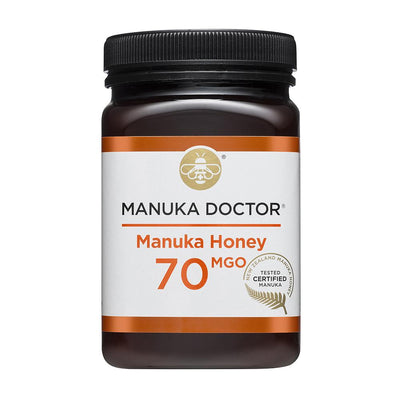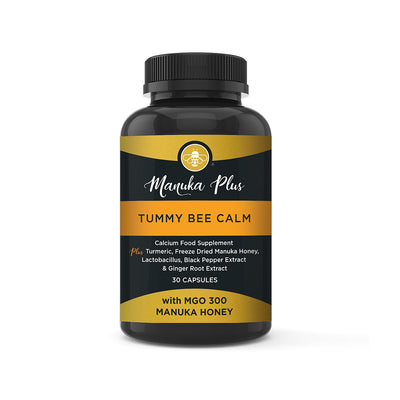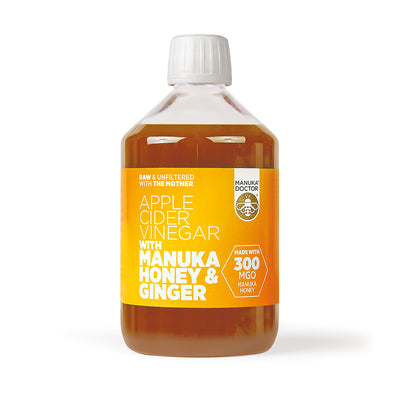You might reach for the Manuka Honey when you have a cough or cold. But did you know Manuka Honey may help your digestion too? Some Manuka fans swear by its gut-boosting powers. So how exactly can it help?
A good bacteria booster
In recent years, friendly bacteria have been big news. A healthy community of good gut bugs – known as the microbiome – is essential for efficient digestion and for strong immunity, including fighting off bugs, such as those that cause food poisoning. Some research also suggests a diverse, thriving microbiome has a range of other health benefits, including keeping you slim and preventing heart disease.
Unfortunately, modern living’s a bit of a gut microbiome enemy. Your good bugs start building up from birth, and if you were born by Caesarean, you miss out on the dose of bacteria you get from a vaginal delivery. Breastfeeding delivers another whack of friendly bacteria – so if you were bottle-fed, you’ve missed out again. Later on, antibiotics, stress and poor diet can further diminish your community of healthy bacteria.
Hence the current interest in probiotics and prebiotics. Probiotics are friendly bacteria, such as acidophilus, bifidobacterium and lactobacillus, which are the same as, or similar to, those found naturally in your gut.1 Prebiotics are foods that help probiotics flourish – effectively, they act like manure for good bacteria. Effective prebiotic foods include leeks and bananas – but honey has also been shown to have prebiotic activity.2
Studies have revealed that honey contains types of prebiotic called fructo-oligosaccharides, which stimulate and maintain the growth of probiotics including lactobacillus and bifidobacterium.3
And Manuka Honey may be particularly potent when it comes to gut health. Here’s how...
It may help fight stomach ulcers
Some research has found Manuka Honey’s natural antibacterial action may have a role in fighting H.pylori, the bacteria that causes stomach ulcers. But Manuka Honey is also now known to be an effective prebiotic, boosting levels of a strain of lactobacillus, which also protects against stomach ulcers. So scientists believe it may have a double-pronged action.4 At the moment, it’s not clear how much Manuka Honey you’d have to take to tackle a stomach ulcer, though, and more research is needed.
It can help with food poisoning
Manuka Honey is known for its antibacterial effects - and it may work well against one of the main bugs that causes serious food poisoning. Clostridium difficile – usually shortened to c. difficle – causes diarrhoea and other unpleasant and sometimes severe symptoms. A 2013 study revealed Manuka Honey inhibited the growth of the bacteria and could be an effective potential treatment.5

Manuka Honey may ease IBD symptoms
When it comes to other gut issues, there’s still probably not enough robust science to say for sure how and why Manuka may be helpful. Early research has suggested Manuka Honey may be effective in reducing inflammation in inflammatory bowel disease (IBD), and some people with the condition swear by it. But more studies are needed to understand how it may help.
Lifting the Lid on IBS Symptoms
IBS is a long-term condition with symptoms that tend to come and go over time. Symptoms often change over time and can usually be managed so that you feel better. It can be helpful to keep a diary to pinpoint what causes flare ups. Are there certain things that seem to worsen your IBS? If so, sorting these out can be helpful.
Lifestyle habits do not cause IBS but minimising excesses may help reduce or avoid symptom flare-ups. Things like lack of sleep and lack of exercise, prolonged stress, or irregular eating habits can worsen symptoms.
Friendly bacteria, also known as probiotics, found in supplements or drinks, can boost the numbers and type of ‘good’ bacteria in your intestine. A healthy microbiome has been shown to support the immune system, improves nutrient absorption and may improve digestive health, easing diarrhoea and certain symptoms of irritable bowel syndrome, like inflammation [6].
IBS symptoms have been linked to certain changes in the gut flora. For example, people with IBS have lower amounts of Lactobacillus and Bifidobacterium in their guts, and higher levels of harmful Streptococcus, E. coli and Clostridium [7,8]. Our digestive health supplement, Tummy Bee Calm, contains 1 billion CFU Lactobacillus acidophilus, a type of friendly bacteria that can help restore the natural balance of microflora in the gut.[9]
Tummy Bee Calm also contains other ingredients specially designed to aid digestive health, including Calcium, needed for the normal function of digestive enzymes for food break-down;[10] Ginger, which can speed up the rate at which your stomach empties after a meal;[11] and Turmeric, a natural anti-inflammatory which contains the compound Curcumin and has been shown to support the friendly bacteria in your gut [12] and act as an anti-inflammatory agent that has a therapeutic benefit to aid digestion and can benefit disorders such as IBS [13].
What else can I try to improve my gut health?
Gut boosting ingredients Turmeric, Ginger and Manuka honey have also been combined in our Apple Cider Vinegar tonic. Apple Cider Vinegar is made from fermenting apples which turns them into acetic acid; the active ingredient in the vinegar. Manuka Doctor Apple Cider Vinegar is unfiltered, giving it a cloudy appearance due to the presence of a cobweb like substance known as ‘The Mother’ containing proteins, enzymes and friendly bacteria for extra health benefits.
"I suffer with gastric reflux and this helps a lot." Richard H.
Apple Cider Vinegar with Manuka Honey & Ginger. 5 star customer review. November 2021.
Like other fermented foods such as yoghurt, our raw unfiltered Apple Cider Vinegar can be considered a probiotic as it contains healthy bacteria which help to maintain a healthy gut microbiome, and Apple Cider Vinegar is particularly beneficial as apples contain pectin which has been shown to aid digestion [14,15].
If you have problems with your gut health you can read more about improving digestive issues in this blog and also learn more about our award-winning digestive health supplement, Tummy Bee Calm.
How to take manuka honey for digestive problems
If you want to try Manuka Honey for gut health, why not try mixing it with other gut-friendly foods? Here are some ideas:
- Swirl a spoon of Manuka Honey into some plain live yoghurt, which contains probiotic bacteria
- Add a little Manuka Honey to a fruit salad – fruit is rich in fibre, essential for feeding good gut bugs
- Spread Manuka Honey onto a fibre-dense oat cake and add chopped banana, another effective prebiotic.
"Taste and texture very good. Has helped with my digestive problems and I would purchase again. Well packed and prompt delivery." Sally N.
540 MGO Manuka Honey. 5 star customer review. September 2021.





